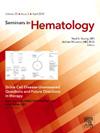黑色素瘤抗原基因(MAGE);多发性骨髓瘤的新功能靶点。
IF 4.1
3区 医学
Q1 HEMATOLOGY
引用次数: 0
摘要
黑色素瘤抗原基因(MAGE)在包括多发性骨髓瘤在内的多种癌症中均有表达。30 多年来,人们一直在研究 MAGE 作为免疫疗法靶点的作用,与此同时,对其功能的研究也发现了在多发性骨髓瘤中可能特别关键的活性。在新诊断的病例中,MAGE-C1 在大约 75% 的病例中表达,并在疾病的自然史中保持不变。相比之下,MAGE-A3在新诊断病例中的表达率约为35%,但在复发后会增加到75%以上。MAGE-A3 的表达与不良的临床预后和对化疗的耐药性有关。转化研究发现,MAGE-A3 可调节骨髓瘤细胞的细胞周期和凋亡。基因组、基因表达和多基因组研究表明,MAGE-A3 与高风险亚组患者有关。MAGE-A3通过与Kap1合作形成泛素连接酶复合物来介导这些功能。通过对 MAGE-A3 和 Kap1 之间相互作用的结构分析,可以深入了解它们的生化活性和底物特异性,并提出了抑制它们的新型药物策略。这些证明 MAGE-A3 致癌功能的研究表明,它也可能是多发性骨髓瘤小分子抑制剂的合适靶点,并可广泛应用于其他表达 MAGE-A3 的癌症。本文章由计算机程序翻译,如有差异,请以英文原文为准。
Melanoma antigen genes (MAGE); novel functional targets in multiple myeloma
Melanoma Antigen Genes (MAGE) are expressed in a broad range of cancers, including multiple myeloma. MAGE have been under investigation for more than 3 decades as targets for immune therapy, while in parallel, interrogation of their functions has revealed activities that may be particularly critical in multiple myeloma. MAGE-C1 is expressed in about 75% of newly diagnosed cases and this is maintained through the natural history of the disease. In contrast, MAGE-A3 is expressed in about 35% of newly diagnosed cases, but this increases to more than 75% after relapse. MAGE-A3 expression was associated with poor clinical outcome and resistance to chemotherapy. Translational studies have revealed that MAGE-A3 regulates cell cycling and apoptosis in myeloma cells. Genomic, gene expression, and multiomic studies demonstrate relations with high-risk subgroups of patients. MAGE-A3 mediates these functions through partnership with Kap1 to form a ubiquitin ligase complex. Structural analysis of the interaction between MAGE-A3 and Kap1 gives insight into the biochemical activity and substrate specificity and suggests novel pharmacologic strategies to inhibit them. These studies demonstrating MAGE-A3 oncogenic functions suggest that it may also be a suitable target for small molecule inhibition in multiple myeloma that may be broadly applicable to other cancers that express it.
求助全文
通过发布文献求助,成功后即可免费获取论文全文。
去求助
来源期刊

Seminars in hematology
医学-血液学
CiteScore
6.20
自引率
2.80%
发文量
30
审稿时长
35 days
期刊介绍:
Seminars in Hematology aims to present subjects of current importance in clinical hematology, including related areas of oncology, hematopathology, and blood banking. The journal''s unique issue structure allows for a multi-faceted overview of a single topic via a curated selection of review articles, while also offering a variety of articles that present dynamic and front-line material immediately influencing the field. Seminars in Hematology is devoted to making the important and current work accessible, comprehensible, and valuable to the practicing physician, young investigator, clinical practitioners, and internists/paediatricians with strong interests in blood diseases. Seminars in Hematology publishes original research, reviews, short communications and mini- reviews.
 求助内容:
求助内容: 应助结果提醒方式:
应助结果提醒方式:


